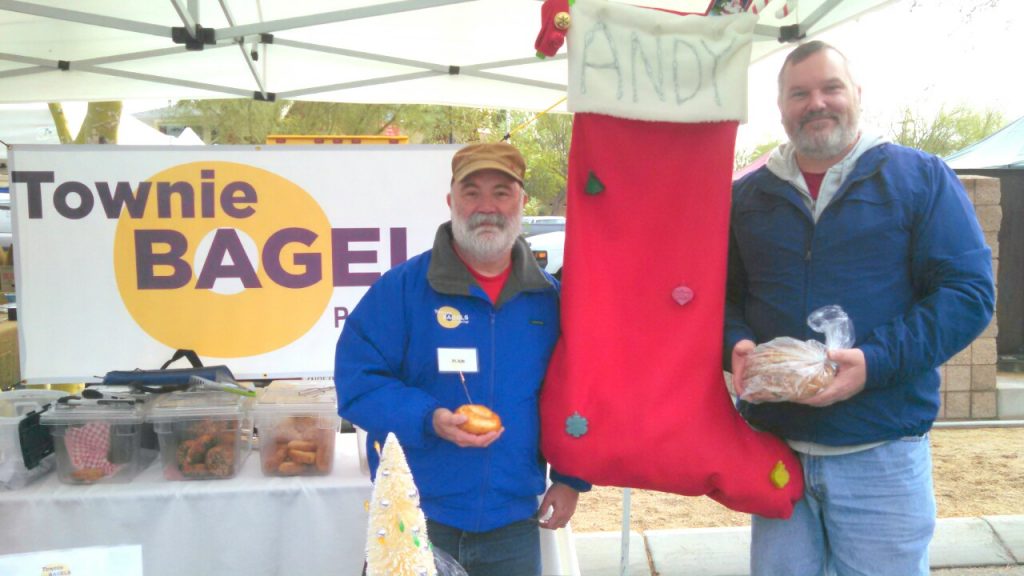“Nothing Permanent Except Change”
This quote by the Greek philosopher Heraclitus was surely not specifically referring to the collection of fisherfolk and farmers selling their wares at his local outdoor Market. But the fact that Markets continue to operate in a similar fashion to the way they always have since 550 B.C. pretty much proves the point. We bring it up now because we’re feeling reflective, a month having passed since our 10th anniversary as an organization. It continues to be true each week – our configuration of businesses sets up like a miniature model of a city street, enticing displays under colorful roofs, with salespeople engaging their customers with well-rehearsed patter. Money changes hands, an authority figure bustles about solving problems and answering questions, street musicians fill the air with song and as the sun rises to its apex, the whole enterprise begins to reverse. Crates are tidied away, banners are rolled up and fees paid. With the synchronicity of a ballet, a line of vans leave the lot and the “town” disappears with no evidence of it having been there.

A Living Organism
And yet it WAS, and you have the microgreens/eggs/honey/soap to prove it! But like the seasons, items of produce are perpetually showing up and disappearing. One week a farmer brings kumquats, and 14 days later they’re all gone until the next year. In order to maximize our nutritional benefits and protect our environment we’re supposed to ride the tide of crop seasonality and eat what’s locally available. (Way easier for SoCal than 7/8ths of the country) Deep down we know this “cycle of life” idea is right and true, but most of us were raised in an environment where the industrial powers that be trained us to think we could and should have everything our hearts desire, all the time – AND we deserve it, too. If it’s at the store, why shouldn’t we go ahead and buy it? Just when you wrap your brain around the idea that delayed gratification might be the better route and we get comfortable anticipating fleeting heirlooms and OK with them running out (helloo/goodbye Wong Farms tomatoes), the whole rug gets pulled out from under us. One day there’s a big gap where our favorite farm or vendor used to be.
The Not-So Great Unknown

“What the heck?” we sulk, “I should just go back to shopping at Albertson’s/Cardenas/Ralphs. Cucumbers are always in season there, and the produce section never gets a flat tire and doesn’t show up.” “What is going on with this Farmers’ Market? X Farm isn’t here – the Market is falling apart!” It’s petulant and childish, but it feels good to complain. Yet, if we remember that each canopy represents a person – a family – we’re exposed in our folly. Every change, whether temporary or permanent, involves a story as complex and full of nuance as our own. Take Nest Farm for example – Mario, Sara and their kids lived high in the hills above Hemet, but their main farmland was even higher, in Anza. It was an hour drive away on winding roads and the sometimes snowy conditions made winter farming a challenge. They made the decision to move their entire farm operation to a property on the outskirts of lowland Hemet early last fall on land with good access to water that had never been used for farming before. Being inside the city limits makes permitting slow, so they have not been able to set up their greenhouses yet, and the tomato seedlings they bought to plant outside were frozen in last week’s sudden storm. They are making progress, but sometimes a step forward involves a trip over red tape and a backwards step into a gopher hole. They’re getting close to returning, but it’s hard to pin down a date when Mother Nature and a city permitting department calls the shots.
Fledging and Flying

One of our goals as an organization, in addition to providing an economic platform for CA small family farms, is to be a business incubator for new artisan culinary and sustainably-focused companies. They agree to collaborate with small farms and each other for ingredients and make their products locally, and we provide a location to sell and a regular customer base. They don’t have the utilities or big start-up costs that come with a brick-and-mortar location when they begin with us, and can gain a following before going to the next level. Townie Bagels and Raw Remedy are two businesses that used the CFMCV’s to launch their concepts before finding a storefront. Proud as parents sending a teen off to college, we would never dream of holding them back. More recently, Chef Rob Wepplo used all three Markets to offer his culinary talents under the red tent and blue banner of Cafe KIST. It proved a great platform, and now that season is in full swing he’s so busy catering and teaching cooking classes, he only sells KIST wraps on Wednesdays at the Palm Desert Market. Gabrielle Gaul from Herbivore started at the Markets selling potted herbs, but eventually expanded her offerings to dried herb blends, herbed chocolate and herb flatbread. When she told us she was thinking of trying the Joshua Tree Market on Saturdays, we encouraged her to do whatever was best for her company. Her products are a hit with the tourists and locals in the high desert, and she still sells to her CV fans in Palm Desert and La Quinta. We consider these stories successes for our track record as business birthers!
Here Come the New Kids

Word has gotten out that our Markets are something special – weekly we field multiple calls from people looking to participate in our events. Sometimes they’re selling their artisan goods in other cities and have heard from our vendors that the customers in the CV appreciate high quality. In other cases they just have a seed of an idea – aspirations to elevate a family recipe to a business or share their passion for food with others – and walk through one of our Markets and the atmosphere makes the idea bloom into a plan. We then do our best to guide those folks through the steps and hoops to making it happen with us or directing them to other venues. We ask much more of applicants than most Markets – vendors must use some CA ingredients, can’t resell other people’s goods, no GMO’s and farmers must be certified by their county and offer produce that’s unique and not overlapping with our current farms. It’s a long, involved process so you can rest assured that only the best applicants prevail!
So with that prologue, we’re delighted to announce some of the new collaborators set to join us in the coming month…Last week we debuted hand-crafted and meticulously sourced Riley’s Brand Tea at all three Markets. Combining dried fruit, herbs, spices and USDA tea leaves, Riley’s Brand aspires to create peace and harmony in your tea pot. This Saturday (3/10) El Buen Cacao offers new versions of the most sought after bean on the planet. With chocolate bars, seasonally available chocolate dipped fruit and a hot chocolate drink, the El Buen Cacao bean-to-bar experience promises to be truly exceptional. Finally, in the first week of April My E-Waste Drop Off will set up shop to…well, the name gives it away. David Garcia joins us as the latest addition to our CFMCV category of businesses who encourage sustainable living. He and his “downstream” contractors collect all sorts of electronics you no longer use and repurpose, recycle and safely disassemble the components based on state R2 standards, so you can be assured that toxic chemicals and debris do not injure anyone or pollute our planet. Win!
In conclusion – 1.) Visit our former participants in their new digs 2.) Congratulate our current participants moving to new heights of success 3.) Send prayers and good thoughts to our farms working through challenging weather patterns 4.) Welcome the new folks with enthusiasm and patronize their businesses!